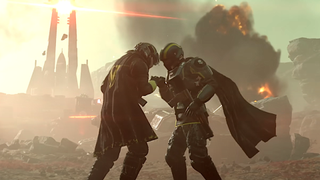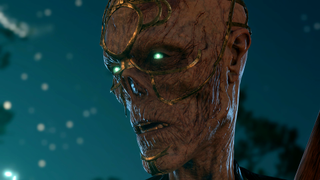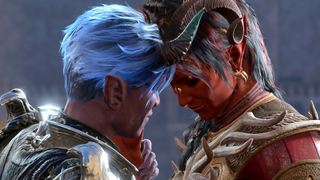We keep arguing about great games like Helldivers 2 and Baldur's Gate 3 because it's always possible to love a good thing to death
Or: You will never find a game you can play forever, sorry.

The dust has settled on the first proper balance patch of Helldivers 2. That's due to a combination of factors: mechs are in the game now, heavily-armoured units spawn less, and dedicated anti-tank weapons like the Recoilless Rifle are somewhat-filling the void the old Railgun left.
Still, it was fraught for a while, causing an apology from Arrowhead after some tense words from the developers that had some particularly 'vocal' players calling in their orbital pitchfork stratagems, even if a couple of said devs were making some good points.
That's not to say peace has returned to the galaxy, far from it. Arc weapons were crashing games for a spell, for instance—but the initial storm has passed, and what a strange storm it was.
I genuinely believe that criticism and feedback are both good and valuable things. There's a reason why developers open the floor to back-and-forth discussions. For instance, Larian Studios built Baldur's Gate 3 off the back of years of successful early access. But there's also a reason why devs inevitably pull back. Like when, uh, Larian Studios had to ask a small, unpleasant minority of modders to please stop sending horrible messages.
While players overstepping lines like that is never acceptable, I think about the source of that anger a lot—not because I want to justify that sort of behaviour, mind, but because I think it's good to reflect on why people lose their perspective enough to act out. And I think it has a lot to do with boredom.
What is love, baby don't hurt me

Successful games (especially runaway hits like Baldur's Gate 3 and Helldivers 2) are played so hungrily and totally that it's better to say they're consumed. Not in the way that you "consume content" online—I mean like in the primal, animalistic sense of the word. Locusts ripping through a cornfield.
There's a certain kind of hunger that players have for the 'perfect game' of any genre, and when one comes close to scratching that particular itch, they'll keep scraping at it until blisters form. I know because I do it all the freaking time.
PC Gamer Newsletter
Sign up to get the best content of the week, and great gaming deals, as picked by the editors.
I was playing a lot of Helldivers 2 when it came out. I mean, I do have a condition that makes me form fixations around objects of excitement for my under-stimulated brain, but it's also just because of who I am as a player. I rarely just feel 'normal' about a game. When I fall in love with one, it eats away at my brain until I can't wring any more excitement out of it.
Even games that are designed to be played 'forever'—MMORPGs, for instance—have mercifully drifted away from mechanics that are angled to dig their claws into you and never let go. Final Fantasy 14, for instance, is explicitly built around allowing players to unsubscribe and "not play every day" if they don't want to, as per an oft-shared comment from the game's director a few years ago.
That didn't stop players devouring it's animal crossing-lite Island Sanctuary mode until it wasn't fun anymore. And the game's current expansion has prompted (fair) critique from players who have run out of road quicker than they'd like, myself included. I want to take a moment to highlight that there is a balance to be walked, here—if a game is designed around a monthly subscription model? Yes, it's reasonable to want patches that give you more than a few short hours of fun.
But the pursuit of a game that never gets boring is self-defeating, because in truth, fun is also two parts novelty. There will always be an amount of time you can pump into any game that will make it worse. We all want something to finally fill the void forever, but it'll never happen—and that's a good thing.
Everything ends

I get very confused whenever I see something like Ubisoft's AI-generated NPCs try to solve a problem in game design that doesn't exactly exist. The promise of these technologies, generally, is that we could use them to procedurally generate entire worlds. An RPG with endless quests and endless content: A Baldur's Gate to end all Baldur's Gates. In short, people really want a game they can never get bored of.
Things you like can't give you the same feeling they once did forever and ever. Chasing that impossibility will cause your fun to sour and spoil.
But I think engaging with games like this is self-defeating, even if I see it happen all the time. Flit through enough Steam reviews, and you'll eventually find someone complaining that a game doesn't 'have enough content' despite getting twenty, thirty, fifty hours out of it. And depending on the price-point, maybe that's a fair consideration—especially if the game explicitly hinges on the idea you'll be playing it for years.
But outside of those extremes, I still see the same behaviour around games like Helldivers 2. Players had logged dozens of hours into it by the time of its first balance patch, they'd grown so accustomed to what it did well that they could only focus on what it was doing poorly. Even if they were correct in their assessment of those issues, for some players, that dissatisfaction grew to bitterness and wildly out-of-proportion behaviour.

Baldur's Gate 3 is going through a similar mourning period in the wake announcements that we won't be getting DLC for it. There's this difficulty (an understandable one) in acknowledging the fact that Baldur's Gate 3 is a complete story.
I've even seen it resurrect the repeatedly-denied-by-the-devs conspiracy that Karlach had a whole bunch of content cut, that her story was 'incomplete' somehow because not all loose ends were tied. Sometimes stories leave room for a future of your own choosing.
The fan fretting in Helldivers 2 and Baldur's Gate 3 are both very different in nature, sure. But they stem from the same root refusal to accept a universal truth: things you like can't give you the same feeling they once did forever and ever.
Chasing that impossibility will cause your fun to sour and spoil. I know because, again, I do it all the time. But just as Helldivers 2 is a game you probably need to take breaks from, Baldur's Gate 3 is a game that deserves to end on the high note its epilogue made for itself.
If your happiness starts depending on how much enjoyment you can wring out of a game, long after you've got your money's worth, that's a good sign it's time to take a holiday—and that is fine, and normal, and right, and good. No game lasts forever.

Harvey's history with games started when he first begged his parents for a World of Warcraft subscription aged 12, though he's since been cursed with Final Fantasy 14-brain and a huge crush on G'raha Tia. He made his start as a freelancer, writing for websites like Techradar, The Escapist, Dicebreaker, The Gamer, Into the Spine—and of course, PC Gamer. He'll sink his teeth into anything that looks interesting, though he has a soft spot for RPGs, soulslikes, roguelikes, deckbuilders, MMOs, and weird indie titles. He also plays a shelf load of TTRPGs in his offline time. Don't ask him what his favourite system is, he has too many.
